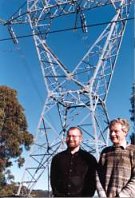Consulting Capabilities
The School of Electrical and Electronic Engineering is able to offer quality consultation at a high technical level to industry and government in a variety of forms.
See our achievements page for examples of our past consulting contracts.
The School has high level engineering expertise in the fields of:
- Biomedical engineering (Dr. D. Abbott, Centre for Biomedical Engineering).
- Cellular mobile networks including radio propagation issues (Dr. B. Davis, Dr. M. Sorell, CCRG).
- Control systems (Dr. C.C. Lim, Dr. M. Gibbard).
- Data acquisition and signal conditioning circuit design (Dr. N. Ertugrul).
- Electric motor technology (Dr. W. Soong, Dr. N. Ertugrul,Dr. A. Parker).
- Electrical power transmission systems (Dr. M. Gibbard).
- Electromagnetic compatibility (Dr. P. Cole).
- Power electronics for electric motor drives (Dr. W. Soong, Dr. N. Ertugrul).
- Power electronics systems design in utility applications (Dr. N. Ertugrul).
- MENTOR Graphics training and use.
- Radio Frequency Identification (RFID) systems (Dr. P. Cole).
- Microwave antennas and systems (Dr. C. Coleman, Dr. P. Cole).
- Modulation systems for communications (Dr. B. Davis).
- Signal processing in image analysis, sonar and radar applications (Prof. R. Bogner, Prof. D. Gray, Dr. D. Abbott, SSP).
- Telecommunication and computer networks and satellite systems (Prof. L. White).
- VLSI circuit design, Digital and analogue, for low power or high speed applications ( Mr. M. Liebelt, Dr. D. Abbott).
In support of consulting activities, the School infrastructure consists of:
- 29 academic staff, most of whom have spent considerable time working as engineers and scientists in industry or government before joining the department.
- Professional engineers working on current consulting tasks.
- Highly qualified technical support staff for design and testing of digital, power, radio frequency and microwave hardware.
- Electronics and mechanical workshops capable of producing quality customized hardware.
- Extensive computing facilities plus software research tools and support staff for software development and simulation work. Software tools consist of:
- Cadence VLSI CAD software.
- Other VLSI CAD software tools, many developed in the Department.
- Power Systems Stability design software MUDPACK developed by the Department.
- MATRIXX, MATLAB.
- Extensive laboratory facilities including a large microwave anechoic chamber for antenna testing and measurement.
- Extensive equipment including: a full suite of modern microwave and RF test equipment such as Network Analysers, Broadband Oscilloscopes and stable Signal Sources; a VLSI Probing station; a modern Tektronix logic analyser and development system; optical laser equipment for biomedical research.
Undergraduate student projects also provide opportunities for small, non-critical consulting tasks which are often highly successful and of good quality.
Examples of successful past and present consulting activities are:
Andrew Beaumont-Smith received the 1999 Electronics Industry Association individual award of excellence for his innovative work on VLSI circuit design of a CMOS High Speed Counter chip for sub-nanosecond precision timing. This was part of a consulting task for Avalon Systems.
Other examples of successful work are:
- VLSI chip development for the Defence Department through the CHiPTeC centre.
- Power system stabilization studies through MUDPACK simulation software for ETSA.
- Sonar, acoustic vibration diagnostics, radar target recognition and laser depth sensing through the Sensor Signal and Information Processing CSSIP centre.
- Passive and active electronic tags for road vehicle identification through the associated ISD company.
- Microwave antenna design and studies for CSIRO and the Defense Department.
- Optical collision avoidance chip based on insect vision, for Britax.
Other smaller consulting tasks which have been successfully completed by staff of the School are:
- Guidance control system with Kalman filtering. For DSTO by Dr. C. C. Lim and Mingyan Li.
- Target motion detection using cell organizing neural networks. For DSTO by Dr. C. C. Lim and Eric Chong.
- Ultrasonic cleaning equipment. For SONICLEAN by Dr. C. C. Lim and final year undergraduate students David Haley and Soon Kin Choo.
- Voice enabling of formatted message systems. For DSTO by Dr. C. C. Lim and final year undergraduate students Tat Tsang and Peter Celinski.
- High speed Phase Locked Loop. For DSTO by Mr. A. Beaumont-Smith and Mr. M. Liebelt.
- FIR filter chip. For DSTO by Mr. A. Beaumont-Smith and Mr. M. Liebelt.
- 3 phase data logger and power analysis. For Wavecom by Dr. N. Ertugrul.
- Developing a portable instrument for a mining drill to observe high torque and thrust. For Boar-Longyear by Dr. N. Ertugrul and final year student S. Mavrakis.


